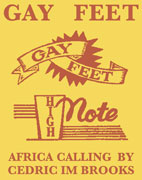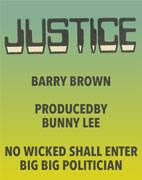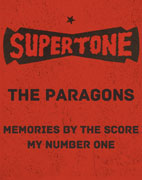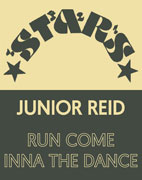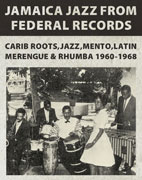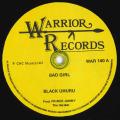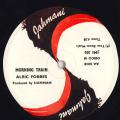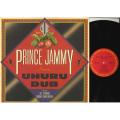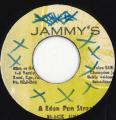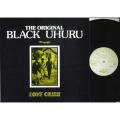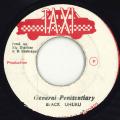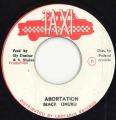Black UhuruText by Harry Hawks
At a time when vocal harmonising was neither profitable nor fashionable Black Uhuru carried their sound and the message of freedom from Kingston's Waterhouse ghetto to the international stage.
Black Uhuru
| Members | Ducky Simpson Garth Dennis Don Carlos Michael Rose Puma Jones Junior Reid |
| Active Period | 1974 - |
| Place of Establishment | Waterhouse Kingston Jamaica |
| Related Artist(s) |
The original Black Uhuru (Uhuru is Swahili for freedom) came together in 1974 from a distinguished Waterhouse vocal group lineage that included The Royals, The Jayes and The Mighty Travellers. After endlessly practising and perfecting their art singing together in the yards of Kingston 11 the trio of Derek 'Duckie' Simpson, Don Carlos and Rudolph 'Garth' Dennis went on to tread the dispiriting round of Kingston's record producers. Their superb 'Going To Zion', recorded for Clive Chin at Randys, was not released until many years later although Tommy Cowan did release their beautiful version of Curtis Mayfield's 'Romancing To The Folk Song' on Dynamic's Top Cat label as 'Folk Song' by Uhuru but the record was not a hit.
Don Carlos then decided to move on to a solo career and Garth Dennis joined the Wailing Souls but, undeterred, Duckie recruited Errol Nelson, who had previously sung with The Jayes, and a new lead singer Michael Rose. Michael's career as a solo artist had included working for Winston 'Niney The Observer' Holness(Winston ‘Niney’ Holness) on 'Guess Who's Coming To Dinner', 'Observe Life' for Dickie Wong's Tit For Tat label and the classic 'Born Free' for UK sound system veteran Ken 'The Mighty Fatman' Gordon in collaboration with Prince Jammy(Lloyd James) and Vivian 'Yabby You' Jackson(Vivian Jackson). Staying true to their Waterhouse roots the new incarnation of Black Uhuru went to Prince Jammy who was then working at King Tubby's Dromilly Avenue recording studio as resident engineer but was also in the process of establishing his own record label. Jammy recorded an entire album's worth of material with the new incarnation of Black Uhuru and 'Love Crisis', released in 1977 on Jammy's own label in Jamaica and in the UK on Count Shelley's Third World outlet, heralded the arrival of a formidable new force in reggae music. The album was not only the foundation stone of Black Uhuru's career but also a crucial stepping stone.
Errol Nelson then returned to The Jayes and was replaced by a former social worker from South Carolina, USA named Sandra 'Puma' Jones who had worked as a dancer with Ras Michael & The Sons Of Negus. Her ethereal harmonies added an entirely new dimension to the group's music and a series of incredibly popular hit singles on Sly & Robbie's Taxi label followed: 'Abortion', 'General Penitentiary', 'Shine Eye Gal' and a new version of Michael's 'Guess Who's Coming To Dinner' which featured Keith Richards from The Rolling Stones on lead guitar. An album, 'Showcase', was released in the UK on the D-Roy label with the vocal tracks segued together with dub workouts of Sly & Robbie's powerhouse rhythms. This seminal album was later released on Taxi in Jamaica, Virgin in the UK and Heartbeat in the USA. Their appearance at 1980's Reggae Sunsplash in Ocho Rios proved to be another career catalyst and Black Uhuru were signed to Chris Blackwell's Island Records that same year.
The group had recorded two singles for Dennis Brown's DEB label, 'Rent Man' and the haunting 'Wood For My Fire', which further heightened their profile. They returned to work with Sly & Robbie as producers and musicians for their first Island album 'Sinsemilla' (aka 'Stalk Of Sensimillia) and the follow up 'Red' which Island released the following year, with initial copies on red vinyl, which reached Number 28 on the UK Albums Chart. Their live appearances, backed by Sly & Robbie, were a triumph and they toured internationally with The Rolling Stones in 1981. That same year 'Love Crisis' was remixed by Jammy and released on Greensleeves Records as 'Black Sounds Of Freedom' and their debut set reached a far wider audience second time around. The group continued to tour and record and their 'Anthem' album from 1985, which included the hit single 'What Is Life', won the first ever Grammy Award for Best Reggae Album.
"Over the course of their first five albums they pursued a course of uncompromising roots music that also transcended most of the genre's limitations." Steve Barrow & Peter Dalton
In 1986 Delroy 'Junior Reid', who had begun his career singing for Augustus Pablo in the seventies, replaced Michael Rose as lead singer and the band hit again with 'Fit You Haffe Fit' on Taxi. They then signed to RAS (Real Authentic Sound) Records in the USA who employed Arthur Baker to produce 'Great Train Robbery' which was included on 'Brutal' their first album release for the company. This track was a minor hit and later appeared on the infamous 'Grand Theft Auto' soundtrack. However the group's move towards dance hall and away from their foundation sound gradually began to alienate their roots reggae audience. Puma left the group due to ill health, and was replaced by Janet 'Olafunke' Reid, but Puma's health continued to deteriorate and she died of cancer in 1990. Junior left in 1988 and Duckie continued working with various line ups over the ensuing years, including a period when he again sang with original members Don Carlos and Garth Dennis, and he was re-united with Michael Rose in 2004 as 'Black Uhuru featuring Michael Rose'.
"Unfortunately the most dynamic and progressive reggae act of the late seventies/early eighties were simply too militant in their poses and music to quite fill the international reggae superstar slot left vacant by the death of Bob Marley despite having three excellent albums given international distribution by Island/Mango as well as a compilation of their first hits with Sly & Robbie released on Virgin (and then the US Heartbeat label)." Steve Barrow & Peter Dalton
There can be no arguing that Black Uhuru's distaste for compromise meant that consistent crossover success always proved elusive for the group yet it is these same qualities that have ensured their lasting status with the reggae cognoscenti with whom their name will be forever revered as one of the most talented, important and influential vocal groups to ever come out of Jamaica.
Sources: Steve Barrow & Peter Dalton: Reggae The Rough Guide Rough Guides Ltd. 1997
Date Added: Sep 26, 2018
Copyright (C) 2024 Dub Store Sound Inc.
Related Item(s)
| Black Uhuru - Bad Girl(Warrior UK (Jammy's))EX/WOL/stain |
B side) Black Uhuru, Prince Hammer - African Love Yogi Bear
| Black Uhuru - A Eden Pon Street(Jammys)VG+/SEW/WOL/marks/edge damage |











